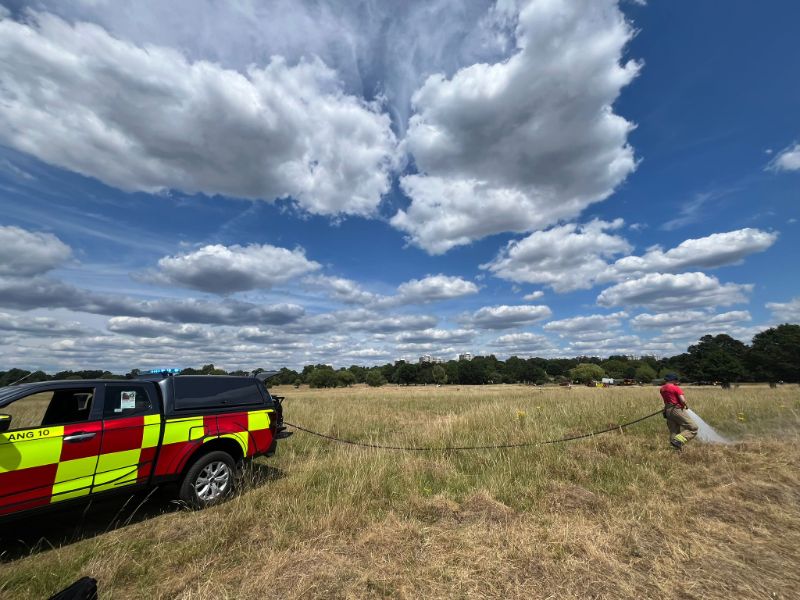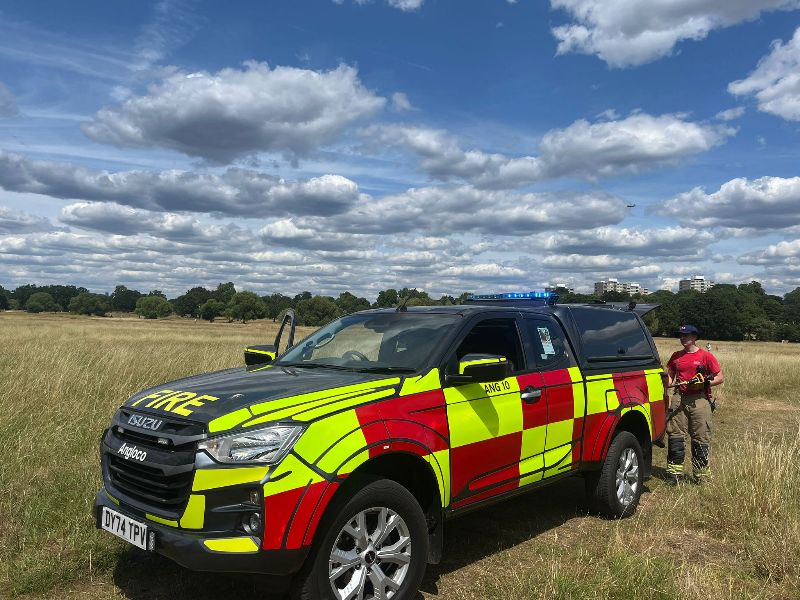London Fire Brigade is warning of the devastating impact wildfires could have on London’s wildlife and green spaces, as crews took part in a wildfire response training exercise in Richmond Park today (3 July).
Working in partnership with The Royal Parks charity, the Brigade staged a simulated wildfire scenario near sensitive wildlife habitats. The exercise aimed to ensure that firefighters and partners are prepared to protect London’s parks and open spaces, residents and wildlife from the increasing threat of wildfires linked to climate change.
The training exercise simulated a wildfire progressing towards sensitive areas including the skylark nesting field, which has been identified by the Royal Parks as being a priority to protect. Partway through the exercise, the simulated wind direction shifted to mimic real-life unpredictability, causing the fire to accelerate uphill towards The Royal Ballet School. This required incident commanders to rapidly adapt their tactics and reprioritise resources. Wildlife, such as red and fallow deer, that roam freely in the park were also factored into the scenario, highlighting the need to account for natural migration patterns during a wildfire response.
Firefighters trained with wildfire beaters, to beat flames, deprive them of oxygen and cool them, as well as water backpacks, which are self-contained water carriers to help where access to appliances is restricted. One of the Brigade’s wildfire responsible vehicles, part of a fleet of four currently being trialled, was also used at the scene.

Crews also practiced drawing water from open sources and planning water supply logistics to sustain operations during a prolonged wildfire. The exercise involved six fire engines, a command unit and a hose layer unit from Richmond, Twickenham, Feltham, Kingston and Wandsworth fire stations. They were joined by colleagues from Surrey Fire and Rescue Service, Royal Parks officers and park teams and Metropolitan Police officers.
The risk of wildfires in London has already been demonstrated, with two heatwaves, which follow the driest spring in over a century and a very warm start to summer. By the end of June, firefighters across the capital had responded to around 17 wildfires this year as well as countless other grass and outdoor fires .
Richmond Borough Commander Rob Davies, who oversaw the exercise, said: “As climate change continues to drive hotter, drier summers, the risk of wildfires in London’s grasslands, woodlands and parks is growing rapidly. This exercise is not just about practising our response; it’s about learning how to defend the landscapes and wildlife that make London unique.
“We’re continuing to work closely with landowners and organisations, like The Royal Parks and our neighbouring fire and rescue services, to strengthen wildfire resilience across the capital. This latest training in Richmond Park is a key step in that preparation.”

This spring has been the driest and sunniest on record, heightening the fire risk across the capital. Richmond Park, with its dry bracken, deadwood and grassland habitats, is particularly vulnerable, especially during extended heatwaves and periods of low rainfall.
Londoners are being reminded that it only takes some sparks to ignite grass, shrubs, or litter and with the dry weather conditions that London has been seeing and will continue to see, any fire can quickly get out of control. Grass and land fires are commonly caused by discarded cigarettes and matches, rubbish left lying around and disposable barbecues.
Paul Richards, Park Manager for Richmond Park, The Royal Parks charity, said: “To keep visitors and wildlife safe, we do not permit barbecues in any area of any Royal Park. It only takes one falling ember onto dry grass to start a terrible fire, which can spread rapidly, pose a risk to life and devastate the environment, destroying wildlife and historic parkland.
“No-one ever believes it’ll be their actions that cause a fire, but fires can start easily, particularly in the current weather conditions. Please take care of yourselves, others, the parks’ wildlife and the landscapes by enjoying a picnic, not a barbecue, and by taking your litter home if the bins are full.”
Tony Whitehead, from the Royal Society for the Protection of Birds (RSPB) said: “Most people are very responsible when out and about enjoying nature, but fires can be started by items that many wouldn’t even consider a risk.
“A simple glass bottle can start a fire on a sunny day, while a discarded cigarette-end or disposable barbecue are accidents waiting to happen - and it can take time for vulnerable birds, trees, and other wildlife to recover from what starts as a small spark.
“We are so grateful to London Fire Brigade and others around the UK for all they do to prepare for the worst-case scenario, and we can all help by not using disposable barbecues or lighting fires, taking litter home with us, and reporting any fires immediately to the fire service."
Safety advice:
Disposable BBQs
- If you are visiting an open park or space, please do not take a disposable barbecue with you – disposable BBQs are banned in many of London’s parks and you can be fined £100 if you are caught ignoring this ban.
- Disposable BBQs should also not be used indoors, on a balcony or in close proximity to flammable items like sheds and fences.
- Disposable BBQs can cause grass fires, especially when the ground is dry. They pose a significant fire risk if they are not used appropriately and extinguished properly because the heat can be retained for many hours even after a BBQ has been put out.
Smoking
- Discarded smoking materials pose a huge fire risk. If you have had a cigarette, please make sure that it is completely out.
- Never throw cigarette ends out of car windows.
- If you are smoking on your balcony, have an ashtray to hand, and don’t flick your ashes off the balcony.
Rubbish
- Leftover rubbish poses a huge fire risk. People are asked to ensure their rubbish is placed securely inside a bin or to take it home with them.
- Don’t leave bottles or glass in woodland or open spaces – sunlight shining through glass can start fires (take them home and recycle them).